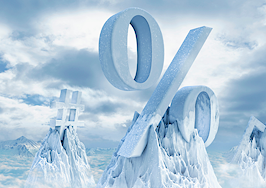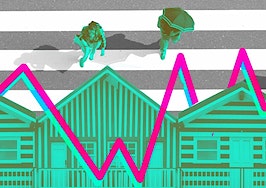After months of relative stability, mortgage rates are headed up as investors who fund home loans digest the prospects for long-term inflation and the Federal Reserve’s plans to taper support for mortgages and government debt.
The average rate for a 30-year, fixed-rate mortgage rose to 3.01 percent, an increase of 13 basis points from the previous week, according to Freddie Mac’s lender survey. The survey provides an idea of how rates for three common types of mortgage change over time.
“We expect mortgage rates to continue to rise modestly which will likely have an impact on home prices, causing them to moderate slightly after increasing over the last year,” Freddie Mac Chief Economist Sam Khater said in a news release.
For the week ending Sept. 30, Freddie Mac’s weekly Primary Mortgage Market Survey reported average rates for the following types of loans:
- For 30-year fixed-rate mortgages, rates averaged 3.01 percent with an average 0.7 point, up from last week’s 2.88 percent figure and near its 2.88 percent mark from a year ago. Rates for 30-year loans hit an all-time low of 2.65 percent during the week ending Jan. 7, 2021, according to records dating to 1971.
- Rates on 15-year fixed-rate mortgages averaged 2.28 percent with an average 0.6 point, rising from last week’s 2.15 percent but still down from a rate of 2.36 percent a year ago. The mark moves the rate for these 15-year loans further from their all-time low of 2.10 percent set the week ending Aug. 5, 2021, according to records dating to 1991.
- For 5-year Treasury-indexed hybrid adjustable-rate mortgage (ARM) loans, rates averaged 2.48 percent with an average 0.3 point, up from 2.43 percent last week and down from 2.90 percent a year ago. Rates on 5-year ARM loans now rest just above the record-low 2.40 percent rate set during the week ending Aug. 5, 2021.
The survey reports average rates lenders are approving for borrowers with excellent credit who put 20 percent down on a home. Borrowers with worse credit can expect to qualify for higher interest rates.
Khater said the spike in mortgage rates wasn’t the result of just one thing.
“Mortgage rates rose across all loan types this week as the 10-year U.S. Treasury yield reached its highest point since June,” Khater said in the release. “Many factors led to this increase, including the Federal Reserve communicating that it will taper its support of the capital markets, the broadening of inflation and emerging energy supply shortages which compound other labor and materials shortages.”
Rates on 30-year fixed mortgages have averaged less than 3 percent since the last week in June. For 30-year loans, lenders had reported an average rate between 2.86 percent and 2.88 percent for seven consecutive weeks.
Federal Reserve Chair Jerome Powell said last week that the central bank could begin to roll back its purchases of bonds and mortgage-backed securities later this year, with the process potentially wrapping up by the middle of next year. Once the Fed’s done tapering — but not before — it could then begin raising short-term interest rates, Powell said.
The tapering timeline is viewed widely as a sign that the Fed board views the economic outlook as favorable, and is keeping a close eye on inflation. But it also means the days of near-historically-low mortgage rates could soon be in the rearview mirror.
Investors in mortgage-backed securities are the ultimate source of funding for most U.S. mortgages. When investor demand for those securities wanes, that can drive up rates paid by borrowers. During the pandemic, the Fed has been one of those investors, increasing its MBS holdings by $40 billion a month, while also bolstering its holdings of government debt by $80 billion a month.
When inflation kicks in, investors are more wary of buying mortgage-backed securities and long-term Treasurys, Nadia Evangelou, senior economist and director of forecasting for the National Association of Realtors, said in a blog post.
“History shows us that rising inflation causes the 10-year Treasury yield to drift up as investors buy stocks instead of bonds,” Evangelou wrote. “Particularly, higher inflation erodes the return that the investor of a bond or loan is holding over time and bonds are not any more attractive to investors. This in turn makes bond values go down and yields rise.”
When yields on 10-year Treasurys go up, mortgage rates tend to follow, since investors view mortgage-backed securities as having similar risks when inflation kicks in.
Treasury yields, mortgage rates and inflation
Evangelou said NAR is currently forecasting that 30-year fixed mortgage rates will hit 3.5 percent by the middle of next year. But “consumer shouldn’t panic,” she said, because even at that level, rates will still be historically low.
Homeowners with fixed-rate mortgages, “may even benefit from higher inflation since they are paying back money at a lower value than it was borrowed,” Evangelou said. “To put it simply, homeowners will pay back less for their loan.”






